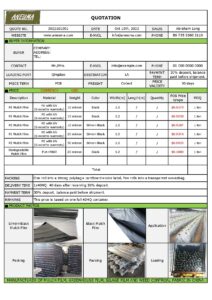Introduction
In the ever-evolving world of agriculture, where innovation meets tradition, one technology has quietly but significantly transformed crop cultivation: mulch film. While it might seem like a humble addition to the farmer’s toolkit, mulch film’s impact on crop growth has been scientifically validated time and again. In this article, we delve into the scientific evidence that supports the use of mulch film to enhance crop growth and productivity.
How Mulch Film Works
Before delving into the scientific studies, it’s crucial to understand how mulch film functions. Mulch film is a thin plastic or biodegradable material placed over the soil’s surface, creating a protective barrier around plants. Its primary functions include:
Thermal Regulation: Mulch film moderates soil temperature by trapping heat during the day and releasing it at night, creating a stable environment for plant roots.
Moisture Retention: It reduces evaporation, conserving soil moisture and ensuring plants have a steady supply of water.
Weed Suppression: By blocking sunlight, mulch film inhibits weed growth, reducing competition for nutrients and resources.
Disease Prevention: It acts as a physical barrier, preventing soil-borne diseases from splashing onto plant leaves.
Scientific Studies on Mulch Film Benefits
Numerous scientific studies have investigated the benefits of mulch film in agriculture. Let’s explore some compelling evidence:
Increased Crop Yields
Case Study: Tomato Crop
In a study conducted on tomato crops, researchers found that using black plastic mulch significantly increased fruit yield compared to bare soil. The mulch film not only enhanced soil temperature and moisture retention but also played a pivotal role in weed control, allowing the tomato plants to thrive without competition.
Case Study: Strawberry Fields
Similarly, strawberry growers have experienced a remarkable difference in crop yield and quality when employing mulch film. Researchers noted that the film created an ideal microclimate for strawberry plants, resulting in larger, juicier berries.
Improved Soil Health
Soil Microbial Activity
Studies have also delved into the impact of mulch film on soil health. Some researchers observed a boost in soil microbial activity under plastic mulch, attributing it to the stable soil environment created by the film. This increased microbial activity can improve nutrient cycling and overall soil health.
Nutrient Retention
Furthermore, mulch film helps retain essential nutrients in the soil. It prevents the leaching of nutrients during heavy rains, ensuring that plants have access to the nutrients they need for healthy growth.
Water Efficiency
Irrigation Reduction
Mulch film’s moisture-retaining properties reduce the need for frequent irrigation. This not only conserves water but also makes crops more resilient to drought conditions.
Drought Resistance
In regions prone to water scarcity, mulch film can be a game-changer. Studies have shown that plants grown with mulch film maintain better moisture levels in the root zone, allowing them to withstand drought stress more effectively.
Mulch Film Types and Varieties
Mulch films come in various types and materials. The choice of mulch film depends on factors like crop type, climate, and sustainability goals. Common types include:
Plastic Mulch Films
- LDPE Mulch: Low-density polyethylene (LDPE) films are durable and widely used. They offer excellent thermal regulation and weed control.
- HDPE Mulch: High-density polyethylene (HDPE) films are thicker and more robust. They provide long-lasting weed suppression and are suitable for extended crop cycles.
Biodegradable Mulch Films
- PLA-Based Films: Made from polylactic acid, these films are biodegradable and environmentally friendly. They break down into harmless components over time.
- Starch-Based Films: Starch-based mulch films are another biodegradable option. They offer weed control while naturally decomposing in the soil.
Challenges and Considerations
While the benefits of mulch film are evident, it’s essential to consider potential challenges:
Environmental Concerns
- Plastic Pollution: Traditional plastic mulch films can contribute to plastic pollution if not properly managed and disposed of.
- Biodegradability: Biodegradable films are a sustainable alternative but may require specific conditions for proper decomposition.
Cost-Benefit Analysis
Farmers need to weigh the costs of purchasing and disposing of mulch film against the increased crop yields and reduced inputs it provides.
Regional Suitability
The effectiveness of mulch film can vary based on climate, soil type, and crop selection. Farmers should choose the right type for their specific conditions.
Future of Mulch Film Technology
The future holds exciting possibilities for mulch film technology:
Innovations in Biodegradable Films
Researchers continue to develop advanced biodegradable films with improved durability and performance, addressing environmental concerns.
Smart Mulch Films
The integration of sensors and data-driven technology into mulch films could revolutionize precision agriculture, allowing farmers to monitor soil conditions and crop health in real-time.
Sustainable Practices
The agricultural industry is increasingly focused on sustainable practices. Mulch film, when used responsibly and in conjunction with recycling programs, can be part of a more sustainable farming approach.
Conclusion
Scientific evidence overwhelmingly supports the use of mulch film in agriculture. It offers a range of benefits, from increased crop yields to improved soil health and water efficiency. However, it’s essential to consider environmental factors and choose the right type of mulch film for your specific farming needs. As we look ahead, innovations in mulch film technology promise even more sustainable and productive farming practices, ensuring a brighter future for agriculture.

